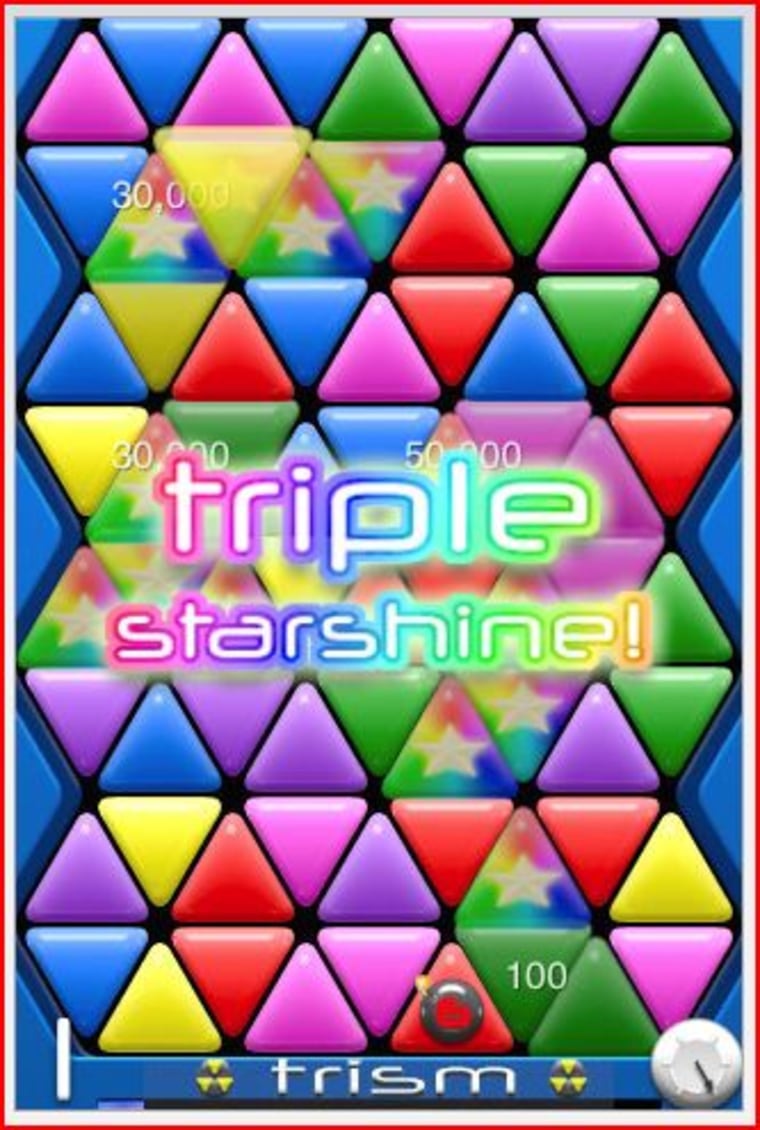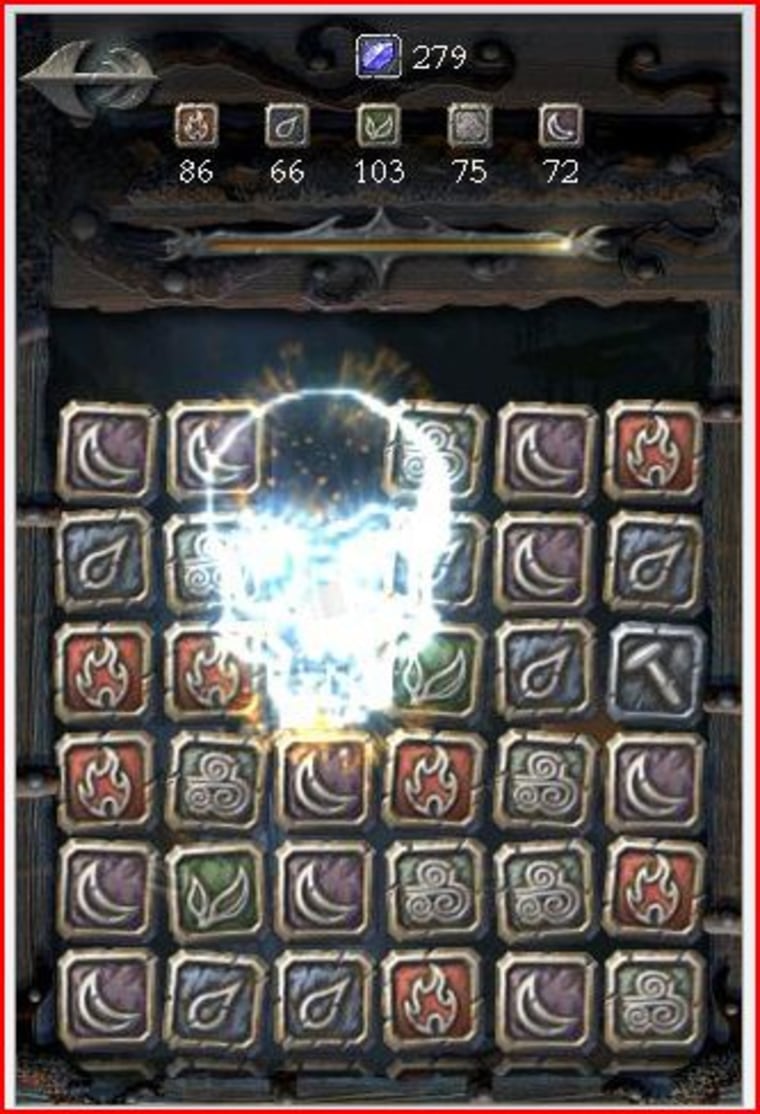Steve Demeter has set one of those modest life goals for himself: He wants to be a millionaire by the time he turns 30.
And while this ambitious little alarm clock is rapidly tick-tocking toward the buzzer, it’s starting to look like the 29-year-old game developer just might slide in under the wire. After all, in the last two months alone Demeter has managed to rake in $250,000 – all thanks to his “cash cow.”
This particular heifer is a little something called “Trism,” a smart, stylish and devilishly addictive puzzle game that, for a mere $4.99, can be downloaded through Apple’s new virtual marketplace – a.k.a. the App Store – and played on the iPhone or the iPod touch.
“It’s a unique game,” Demeter says, trying to explain “Trism’s” many charms. “It’s not something you could get on another mobile phone or one of the handheld consoles out there right now.”
Roger that. As we , Apple CEO Steve Jobs recently made a big show of how the iPod touch and the iPhone have become serious gaming machines – so serious that he seems to fancy them giving Nintendo’s handheld DS game machine and Sony’s PSP a run for their money.
And why not? Apple’s powerful devices boast beautiful, multi-touch enabled touch screens, an accelerometer that senses motion and Internet connectivity. And after its first 60 days in operation, Jobs announced that the App Store already had more than 700 games to offer.
Yes, iPhone and iPod touch owners have quickly found themselves awash in gaming choices – games from big-name publishers as well as lone developers working in their bedrooms, all of them trying to figure out how to spin the Apple devices’ unique assets into gaming gold.
Vivendi Games launched their “Crash Bandicoot Nitro Kart 3D” racing game while Sega brought its “Super Monkey Ball” franchise to the App Store. Earlier this month, Electronic Arts released an iPhone version of its mega-game “Spore,” and THQ delivered “Star Wars: The Force Unleashed” for the iPhone.
And then there are the little guys like Demeter who made “Trism” almost entirely by himself, working late nights while also tending to a day job. Meanwhile, puzzle/role-playing game "Aurora Feint: The Beginning" was created by a two-person development team fueled primarily by caffeinated beverages.
But with all these choices from all these sources, the question remains: Are these App Store games actually any good?
A novel twist
“I was a little guy so I knew I had to make something totally unique,” Demeter says, explaining how he came upon the idea for “Trism,” a souped-up match-three game that puts gravity to work by having players not only slide their finger along the screen to move game pieces, but also tilt and turn their Apple device to slip pieces into place and score points.
“It was a very novel twist on a very proven game concept and people just ate it up,” Demeter says. In fact, so many people have purchased his game that he’s not only quit his day job, but is in the process of hiring six employees to help him work on two new games for the holiday and another four for next year. (FYI: Apple takes 30 percent of the money made from games and other programs sold through the App Store, and gives the other 70 percent to the developer.)

Unfortunately, not all of the games on the App Store are as innovative or as polished as “Trism.”
Tracy Erickson, who writes about App Store games for Pocket Gamer, confirms what my own experiences suggest – that the majority of the games are, well, “to use a harsh word – throwaway content,” Erickson says. “At least 90 percent are really kind of forgettable.”
The App Store is replete with Tetris knockoffs, ports of games we’ve seen before and derivative, shallow or buggy works with a bit of multi-touch and accelerometer play that feels tacked on. At last count, the App Store has 29 Sudoku games.
While I pointed out last week that iPhone owners already have at least 100 more games to choose from than, say, Nintendo DS owners (600 games have been published for the DS in the four years since it launched), what DS owners have is an extensive library of deep, original, innovative games – “Nintendogs,” “Advance Wars” and “The World Ends With You,” to name just a few.
“People who have iPhones and iPod touches are just so enamored with getting games on their phone, they just want to try new applications,” says Jason Citron, one of the two developers behind “Aurora Feint.” “Everyone is just throwing stuff out there and trying new things but it’s low-hanging fruit. People will soon become annoyed with the clutter.”
But Sean Amann, General Manager of Mobile and New Platform Games at RealNetworks, says that some of this is to be expected. He points out that when any new game machine launches, the first games typically aren’t that groundbreaking. (His company is selling “South Park Imaginationland” – a game based on the TV show – through the App Store and has several more in the works.)
“Usually the really innovative products happen in year two, not in year one because it allows for that longer development cycle,” he says.
And Erickson says that it’s actually taking less time than usual to start seeing solid games on Apple’s new devices. He points to Gameloft’s “Asphalt 4” and EA’s “Spore Origins” – two top-notch App Store games.
“Two-and-a-half months after launch we’re already seeing these compelling experiences,” he says. “These are just great games. It doesn’t matter that they’re mobile games.”
Shooting for greatness
"Critter Crunch," "Toy Bot Diaries," "Dizzy Bee" – yes, some excellent games can be found in the App Store.
But creating a great iPhone game is a bit different than creating a great game for another machine. Not only does it need to leverage the touch screen and accelerometer (and not in a way that feels tacked on), but Erickson points out, “you have to look at accessibility. How easy is the game to pick up and play for a few minutes and then put down? They usually only have a few minutes to play when they’re waiting at the doctor’s office or waiting for the bus. The game has to be accessible and bite-sized and have an engaging hook.”
Citron agrees. “You want to feel like you’ve accomplished something in a two-minute or three-minute play session,” he says, explaining that, for this reason, “Aurora Feint’s” levels can be completed in a matter of minutes.
Citron and his partner Danielle Cassley have created something of an indie hit with “Aurora Feint: The Beginning.” While their game is also based in match-three play, they’ve deftly mixed tilt functionality into the game as well as a dose of role-playing. In future installments of the game, they plan to take advantage of the iPhone’s connectivity to turn “Aurora Feint” into a massively-multiplayer online game.
“One of the key things we’re trying to do is redefine what MMOs are about and bring them to the iPhone,” Citron says.
Citron, Demeter and Erickson all say that the social and multiplayer aspects of gaming are going to become an increasingly important part of games made for Apple devices.
“The iPhone is begging for a social experience,” Demeter says, explaining that he implemented an extensive online scoring system for “Trism” for this reason and that his future games will delve into the social experience even deeper.
But figuring how to make a great iPhone game takes time and hard work. That’s why Cassley and Citron are offering “Aurora Feint” for free.
“The iPhone is a new platform. It’s really important to get everything worked out and have a user base that you can talk to,” Cassley says, explaining that they’ve learned a lot from listening to what their users liked and didn’t like about early versions of the game.
Demeter says he, too, shaped “Trism” based on user feedback and cites three points to his stunning success: “One: Strike while it’s hot. Two: Innovate but keep it fun. And three: Treat your core audience like gold.”
